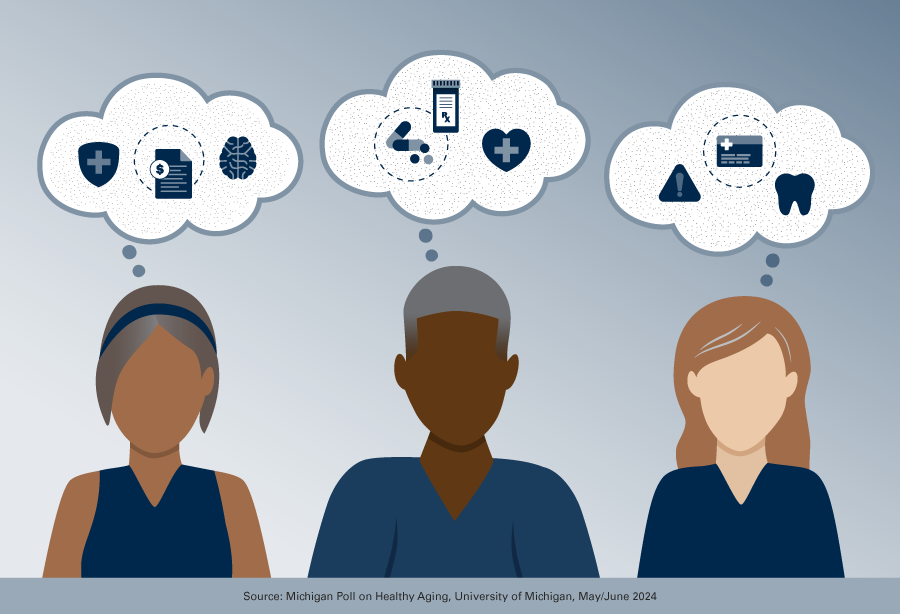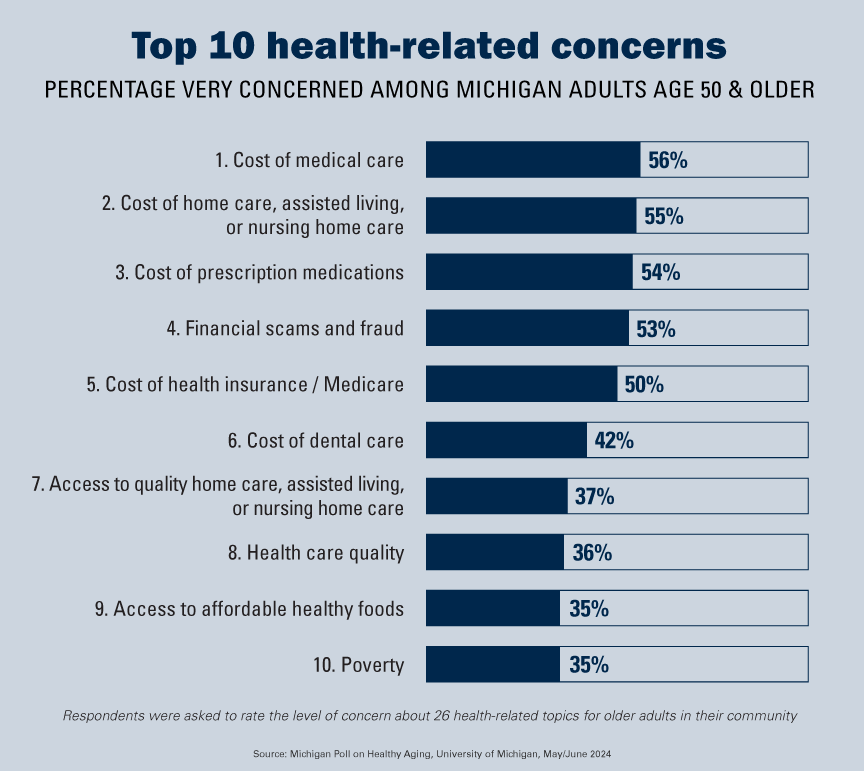
Key Findings
The top three health-related issues Michigan respondents were very concerned about for older adults in their communities included: cost of medical care (56%), cost of home care, assisted living, or nursing home care (55%), and cost of prescription medications (54%).
Women were more likely than men to be very concerned about the cost of home care, assisted living or nursing home care (61% vs. 50%) for older adults in their communities.
Financial scams and fraud was rated the top concern among respondents with annual household incomes under $60,000 (58% very concerned) and the 5th highest concern among respondents with annual household incomes $60,000 or more (48% very concerned).
From medical and dental care to medications, insurance and nursing homes, health-related costs weigh heavily on the minds of older Michiganders of all backgrounds, a new poll suggests.
Asked to rate their level of concern about 26 different health-related topics for people age 50 and older in their community, five of the six issues that the most people cited as very concerning involved health costs.
The sixth – financial scams and fraud – also pertained to money, and can cause significant mental distress.
Those same six topics rose to the top no matter what age, gender, region of the state or income group older adults came from, according to new findings from the new Michigan Poll on Healthy Aging, based at the University of Michigan and supported by the Michigan Health Endowment Fund.
Overall, 56% of Michiganders age 50 and older say they’re very concerned about the cost of medical care for older adults in their community.
Just behind that, 55% of older Michiganders say they’re very concerned about the cost of home care, assisted living or long-term care, which the poll grouped together as one topic.
Nearly as many said they’re very concerned about the cost of prescription medications (54%), about scams and fraud (53%) and about the cost of health insurance or Medicare (50%). And 42% called the cost of dental care very concerning.
For all six of the health issues rated as “very concerning” by the most Michiganders, the percentages were very similar to those seen in a national sample of adults over 50 who were asked the same question via the National Poll on Healthy Aging, supported by AARP and Michigan Medicine, U-M’s academic medical center.
“Michigan’s older adults, like those across the country, clearly see the financial aspects of health as top concerns, which is important in this election year,” said John Z. Ayanian, M.D., M.P.P., a health care researcher, U-M physician and director of U-M Institute for Healthcare Policy and Innovation, where both polls are based.
Other topics rounding out the top 10 health issues that were rated very concerning by the highest proportion of older Michiganders included access to quality home care, assisted living or nursing home care (37%); health care quality (36%); access to affordable healthy foods (35%); and poverty (35%).

Differences between groups
The poll team also looked for areas where Michiganders’ ratings of health concerns varied by gender, age, region or income.
Older Michigan women were more likely than men to say they’re very concerned about the cost of home care, assisted living or nursing home care (61% vs. 50%); financial scams and fraud (60% vs 46%); cost of prescription medications (60% vs. 49%); cost of health insurance or Medicare (54% vs. 46%); and access to quality home care/assisted living/nursing home care (42% vs. 31%). These gender gaps were larger in Michigan than in the national poll.
Michigan women over 50 were also much more likely than men to say they’re very concerned about access to healthy foods (41% vs. 29%); social isolation and loneliness (32% vs. 23%); the ability to age in place (33% vs. 23%); and unequal access to health care (30% vs. 22%).
Regional differences within Michigan were visible in the percentage of adults over 50 who said they were very concerned about several topics.
Older Michiganders in southeast Michigan were more likely to say they’re very concerned about health risks from pollution (25% southeast, vs 19% southwest and south central, 20% central and 11% northern).
Across state regions, older Michiganders living in central Michigan were the most concerned about poverty affecting older adults in their communities (42%), compared to 35% of those living in the northern Lower Peninsula and the Upper Peninsula, 31% in the southwest and south central part of the state, and 30% in the southeast part of the state.
The poll team also analyzed the results by income, comparing those with annual household incomes below $60,000 with those who had incomes above this level. Concerns about financial fraud and scams were mentioned as “very concerning” by more Michiganders with incomes below $60,000 than those with higher incomes (58% vs. 48%). In fact, financial fraud and scams were the top issue for the lower income group, mentioned more often than any form of health-related cost.
People in the lower-income group were also more likely than those in the higher-income group to say they were very concerned about these issues for older adults in their community: the cost of dental care (46% vs. 36%); poverty (43% vs. 24%); access to affordable healthy foods (42% vs. 27%); the ability to age in place (32% vs. 23%); neighborhood safety (28% vs. 16%); health risks from pollution (27% vs. 14%); access to social and recreational activities (21% vs. 12%); and opioid and fentanyl use (26% vs. 18%).
“As our state and nation strive to improve the health and well-being of older adults, it’s important to understand what health-related topics are of most concern to them and how perspectives vary,” said poll director Jeffrey Kullgren, M.D., M.P.H., M.S. “But the high level of concern about cost-related issues across demographic groups points to a particularly important opportunity for action.”
Ayanian and Kullgren are both on the faculty in the Division of General Medicine of the U-M Medical School’s Department of Internal Medicine. Ayanian provides care at University of Michigan Health, the clinical arm of Michigan Medicine, while Kullgren provides care within the VA Ann Arbor Healthcare System. Both have studied how out-of-pocket costs for insurance and care affect health-related decisions.
“As we look to shape effective programs and supports to help people in Michigan age well, it’s essential that we prioritize the voices of older adults within those decisions,” said Kari Sederburg, Vice President of Programs and Director of Healthy Aging at the Michigan Health Endowment Fund. “That’s why the Health Fund is excited to support this new poll focused on Michigan and eager to learn from this critical input from older adults in our state.”
For each of the 26 issues that older adults were asked to reflect on, they were given the choice of saying that an issue was very concerning, somewhat concerning, or not concerning to them, as it relates to older adults in their community.
For an interactive data visualization that gives full access to national and Michigan-specific data from the poll, visit https://michmed.org/Kkde7.
The poll report is based on findings from a representative survey conducted by NORC at the University of Chicago for IHPI and administered online and via phone in February and March 2024 among 1,079 Michiganders over age 50; the national sample included 3,012 non-Michiganders and 367 Michiganders. The sample was subsequently weighted to reflect the state and U.S. population.
Learn about other findings from the Michigan Poll on Healthy Aging, read past National Poll on Healthy Aging reports and about the poll methodology.
Anyone interested in receiving Michigan and national poll reports and other updates may sign up for the email list at https://www.healthyagingpoll.org/email-sign-up